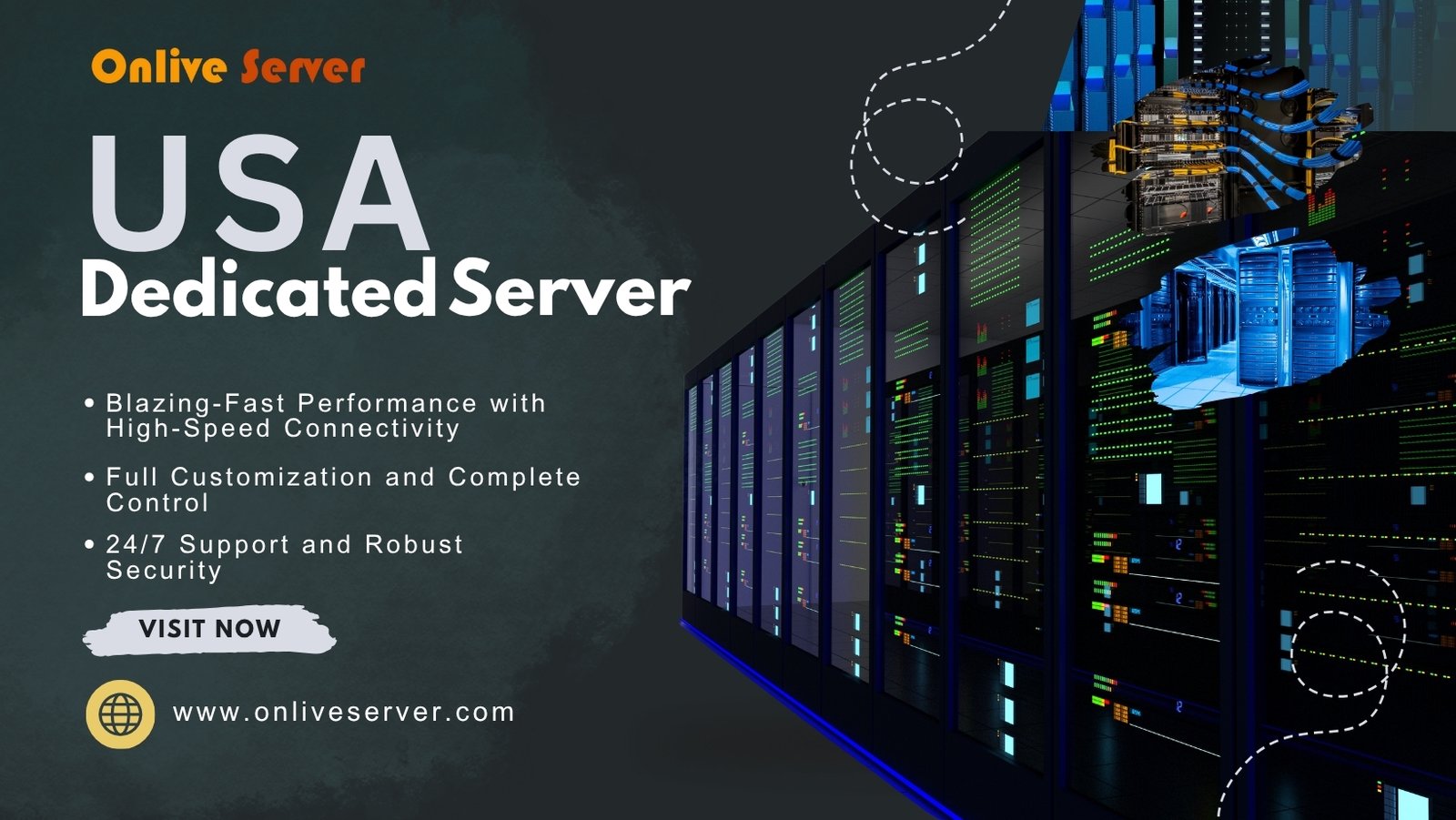Dedicated servers have evolved significantly over the years to meet the increasing demand for high-performance hosting solutions. Initially, hosting environments were predominantly shared, where multiple websites shared resources on a single server. This often led to performance bottlenecks, slower loading times, and unpredictable uptime. However, with businesses expanding their digital footprints, the need for higher performance, security, and control became crucial. This shift paved the way for dedicated servers.
A dedicated server is a physical server that is entirely dedicated to a single client. Unlike shared hosting, where resources like CPU, memory, and bandwidth are shared, USA dedicated servers provide exclusive access to these resources, ensuring consistent performance. As the digital landscape grows, businesses require robust hosting solutions to manage increasing traffic and complex applications, which is where dedicated servers come in. They offer enhanced performance, better security, and full control over the hosting environment,

making them essential for mission-critical applications and high-traffic websites.
How Dedicated Servers Differ from Shared Hosting
Dedicated servers and shared hosting differ primarily in the level of resources and control they provide. Shared hosting involves multiple websites sharing the same server’s resources. This setup is generally cost-effective but can lead to slower speeds, limited scalability, and security concerns due to the shared nature of the server.
In contrast, dedicated servers provide exclusive access to all server resources, including CPU, RAM, and storage, ensuring that your site or application isn’t impacted by the demands of other users. Dedicated hosting offers better performance, security, and customization options, making it ideal for high-traffic websites or businesses requiring specialized configurations.
The Critical Role of Server Performance in Business Operations
Server performance is a fundamental aspect of any business’s online presence. Slow load times, downtime, or unreliable performance can lead to a poor user experience, damaging your brand’s reputation and potentially causing loss of revenue. A high-performance server ensures that your business website or application operates smoothly, supporting smooth transactions, user interactions, and data management without lag or downtime.
Moreover, consistent server performance enhances customer satisfaction, reduces bounce rates, and ensures that your business operations are always online and responsive. For businesses in competitive markets, maintaining top-tier server performance is not just a technical necessity, it’s a critical part of sustaining growth and success.
Why Server Location Matters for Performance
The location of your dedicated server is crucial to its overall performance. The closer the server is to your target audience, the lower the latency and faster the loading times. For businesses targeting US-based customers, hosting your website or application on a USA-based dedicated server ensures low-latency access and improved overall performance for users.
Geographical proximity impacts data transfer speeds. For instance, if your server is located in the US, it minimizes the round-trip time for data requests from US users, ensuring a better user experience. Additionally, server location can affect SEO rankings, with search engines like Google considering server location when ranking websites.
Why Choose a USA Dedicated Server for Optimal Performance
Dedicated servers hosted in the United States offer several strategic advantages for businesses targeting US consumers or those in need of reliable and scalable hosting solutions.
Strategic Advantages of US-Based Data Centers
US-based data centers provide a strategic advantage due to their cutting-edge infrastructure, high bandwidth, and redundancy measures. Many US data centers are located in major tech hubs, ensuring access to high-performance networks and a solid backbone for your hosting. These data centers are also subject to strict regulations and industry standards, ensuring your data is handled securely.
Technical Specifications That Drive Server Performance
The performance of a dedicated server is driven by its technical specifications, which include the processor, memory, storage, and network connectivity. Choosing the right specifications based on your business’s needs is essential for achieving optimal performance.
Processor Options and Their Performance Impact
The processor, or CPU, is one of the most critical components of a dedicated server. High-performance processors like Intel Xeon or AMD EPYC are ideal for handling complex tasks and large workloads. These processors are designed to handle multi-threaded applications and high-traffic websites, offering speed and stability.
The number of cores and clock speed of the processor will determine how fast the server can handle simultaneous requests. For demanding applications like video streaming or data processing, a multi-core processor is essential for maintaining consistent performance.
Memory Configurations for Different Workloads
The amount of RAM on a dedicated server directly affects its performance. For basic websites or applications, 8GB or 16GB of RAM may suffice. However, resource-intensive applications like databases, machine learning models, or large-scale e-commerce platforms require 32GB, 64GB, or even more RAM.
Memory configurations are crucial for smooth multitasking, ensuring that multiple processes can run without impacting server performance. For businesses with fluctuating traffic or large data requirements, opting for higher RAM ensures that the server can handle spikes without crashing.
Storage Solutions: SSD vs. HDD Performance Comparison
When it comes to storage, Solid State Drives (SSDs) offer superior performance compared to traditional Hard Disk Drives (HDDs). SSDs provide faster read/write speeds, which directly improves website load times and application performance.
Network Bandwidth and Connectivity Features
Network bandwidth and connectivity features play a vital role in server performance. A dedicated server with high bandwidth allows for faster data transfers, reducing bottlenecks when handling large volumes of data.
For optimal performance, ensure that your USA dedicated server offers higher bandwidth, especially if you expect high traffic. Additionally, servers with redundant connections and network failover options guarantee uptime and reliability, ensuring that your users always have access to your site or application.
Security Features of Premium USA Dedicated Server Solutions
Security is a critical concern for businesses hosting sensitive data. Premium USA dedicated server solutions provide comprehensive security features to protect your data and ensure that your applications remain secure.
Network Security Protocols and DDoS Protection
Advanced network security protocols, such as firewalls, intrusion detection systems (IDS), and Distributed Denial of Service (DDoS) protection, are standard in premium USA dedicated server solutions. DDoS protection safeguards your server from large-scale attacks that could overwhelm your network and cause downtime.
Disaster Recovery and Backup Solutions
A robust disaster recovery plan and regular backups ensure that your data is safe in case of server failures or catastrophic events. USA dedicated servers typically offer offsite backup solutions to protect critical data, allowing for quick recovery and minimal disruption to your business operations.
Comparing Dedicated Servers to Other Hosting Solutions
When compared to shared hosting, VPS hosting, and cloud hosting, dedicated servers offer unparalleled performance and control. While shared hosting may be affordable, it lacks the power and customization of dedicated servers. VPS hosting offers more control but still shares resources, limiting performance.
Conclusion
In today’s digital landscape, consistent performance is key to business success. USA dedicated servers, including cheap dedicated servers, provide the reliability, security, and performance needed for demanding applications and high-traffic websites, without breaking the bank. By choosing the right technical specifications, server location, and security features, businesses can achieve optimal performance and deliver a seamless experience to their users—while keeping costs affordable. Cheap dedicated servers offer an excellent balance of value and performance, making them a smart choice for businesses looking to scale without sacrificing quality.
